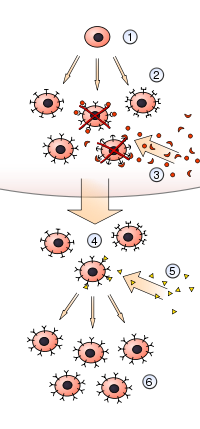- Clonal selection
-
 Clonal selection of lymphocytes: 1) A hematopoietic stem cell undergoes differentiation and genetic rearrangement to produce 2) immature lymphocytes with many different antigen receptors. Those that bind to 3) antigens from the body's own tissues are destroyed, while the rest mature into 4) inactive lymphocytes. Most of these will never encounter a matching 5) foreign antigen, but those that do are activated and produce 6) many clones of themselves.
Clonal selection of lymphocytes: 1) A hematopoietic stem cell undergoes differentiation and genetic rearrangement to produce 2) immature lymphocytes with many different antigen receptors. Those that bind to 3) antigens from the body's own tissues are destroyed, while the rest mature into 4) inactive lymphocytes. Most of these will never encounter a matching 5) foreign antigen, but those that do are activated and produce 6) many clones of themselves.
The clonal selection hypothesis has become a widely accepted model for how the immune system responds to infection and how certain types of B and T lymphocytes are selected for destruction of specific antigens invading the body.
Contents
Four predictions of the clonal selection hypothesis
- Each lymphocyte bears a single type of receptor with a unique specificity (by V(D)J recombination).
- Receptor occupation is required for cell activation.
- The differentiated effector cells derived from an activated lymphocyte will bear receptors of identical specificity as the parental cell.
- Those lymphocytes bearing receptors for self molecules will be deleted at an early stage.
Early work
In 1954, immunologist Niels Jerne put forward a hypothesis which stated that there is already a vast array of lymphocytes in the body prior to any infection. The entrance of an antigen into the body results in the selection of only one type of lymphocyte to match it and produce a corresponding antibody to destroy the antigen.
This selection of only one type of lymphocyte results in it being cloned or reproduced by the body extensively to ensure there are enough antibodies produced to inhibit and prevent infection.
Further work
Australian immunologist Frank Macfarlane Burnet with input from David W. Talmage worked on this model, and was the first to name it "clonal selection theory." Burnet explained immunological memory as the cloning of two types of lymphocyte. One clone acts immediately to combat infection whilst the other is longer lasting, remaining in the immune system for a long time, which results in immunity to that antigen. In 1958, Sir Gustav Nossal and Joshua Lederberg showed that one B cell always produces only one antibody, which was the first evidence for clonal selection theory.[1]
Theories supported by clonal selection
Burnet and Peter Medawar worked together on understanding immunological tolerance, a phenomenon also explained by clonal selection. This is the organism’s ability to tolerate the introduction of cells without an immune response as long as this occurs early in the organism’s development. There are a vast number of lymphocytes occurring in the immune system ranging from cells which are tolerant of self tissue to cells which are not tolerant of self tissue. However, only cells that are tolerant to self tissue will survive the embryonic stage. If non-self tissue is introduced, the lymphocytes which develop will be the ones which included the non-self tissues as self tissue.
In 1949 Burnet proposed that under certain circumstances, tissues could be successfully transplanted into foreign recipients. This work has led to a much greater understanding of the immune system and also great advances in tissues transplantation. Burnet and Medawar shared the Nobel Prize for physiology and medicine in 1960.
In 1974 Niels Kai Jerne proposed that the immune system functions as a network, that is regulated via interactions between the variable parts of lymphocytes and their secreted molecules. Immune network theory is firmly based on the concept of clonal selection. Jerne won the Nobel Prize for medicine or physiology in 1984, largely for his contributions to immune network theory.
See also
- Immune system
- Adaptive immune system
- Clonal Selection Algorithm
- Universal Darwinism
References
- ^ Nossal, G. J. V. & Lederberg, J. 1958. Antibody production by single cells. Nature 181:1419-1420
- "Biology in Context - The Spectrum of Life" Authors, Peter Aubusson, Eileen Kennedy.
- Forsdyke, D.R. 1995. The Origins of the Clonal Selection Theory of Immunity FASEB. Journal 9:164-66
External links
Animation of clonal selection from the Walter & Elisa Hall institute.
Categories:
Wikimedia Foundation. 2010.
